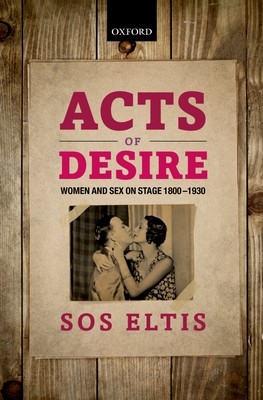
- We will send in 10–14 business days.
- Author: Sos Eltis
- Publisher: Oxford University Press, USA
- ISBN-10: 0199691355
- ISBN-13: 9780199691357
- Format: 16.3 x 23.6 x 2.3 cm, hardcover
- Language: English
- SAVE -10% with code: EXTRA
Reviews
Description
From seduced maidens to adulterous wives, bigamists, courtesans, kept women and streetwalkers, the so-called 'fallen woman' was a ubiquitous and enduring figure on the Victorian and Edwardian stage. Acts of Desire traces the theatrical representation of illicit female sexuality from early nineteenth-century melodramas, through sensation dramas, Ibsenite sex-problem plays and suffrage dramas, to early social realism and the well-made plays of Pinero, Jones, Maugham, and Coward. This study reveals and analyses enduring plot lines and tropes that continue to influence contemporary theatre and film. Women's illicit desires became a theatrical focus for anxieties and debates surrounding gender roles, women's rights, sexual morality, class conflict, economics, eugenics, and female employment. The theatre played a central role in both establishing and challenging sexual norms, and many playwrights exploited the ambiguities and implications of performance to stage disruptive
spectacles of female desire, agency, energy, and resourcefulness, using ingenuity and skill to evade the control of that ever watchful state censor, the Lord Chamberlain.
EXTRA 10 % discount with code: EXTRA
The promotion ends in 21d.00:30:52
The discount code is valid when purchasing from 10 €. Discounts do not stack.
- Author: Sos Eltis
- Publisher: Oxford University Press, USA
- ISBN-10: 0199691355
- ISBN-13: 9780199691357
- Format: 16.3 x 23.6 x 2.3 cm, hardcover
- Language: English English
From seduced maidens to adulterous wives, bigamists, courtesans, kept women and streetwalkers, the so-called 'fallen woman' was a ubiquitous and enduring figure on the Victorian and Edwardian stage. Acts of Desire traces the theatrical representation of illicit female sexuality from early nineteenth-century melodramas, through sensation dramas, Ibsenite sex-problem plays and suffrage dramas, to early social realism and the well-made plays of Pinero, Jones, Maugham, and Coward. This study reveals and analyses enduring plot lines and tropes that continue to influence contemporary theatre and film. Women's illicit desires became a theatrical focus for anxieties and debates surrounding gender roles, women's rights, sexual morality, class conflict, economics, eugenics, and female employment. The theatre played a central role in both establishing and challenging sexual norms, and many playwrights exploited the ambiguities and implications of performance to stage disruptive
spectacles of female desire, agency, energy, and resourcefulness, using ingenuity and skill to evade the control of that ever watchful state censor, the Lord Chamberlain.


Reviews